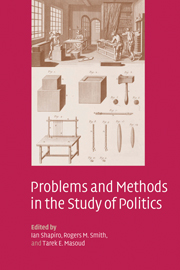Book contents
- Frontmatter
- Contents
- List of contributors
- Acknowledgments
- 1 Introduction: problems and methods in the study of politics
- Part I Description, explanation, and agency
- Part II Redeeming rational choice theory?
- Part III Possibilities for pluralism and convergence
- 12 The illusion of learning from observational research
- 13 Concepts and commitments in the study of democracy
- 14 Problems chasing methods or methods chasing problems? Research communities, constrained pluralism, and the role of eclecticism
- 15 Method, problem, faith
- 16 Provisionalism in the study of politics
- 17 What have we learned?
- Index
- References
14 - Problems chasing methods or methods chasing problems? Research communities, constrained pluralism, and the role of eclecticism
Published online by Cambridge University Press: 22 September 2009
- Frontmatter
- Contents
- List of contributors
- Acknowledgments
- 1 Introduction: problems and methods in the study of politics
- Part I Description, explanation, and agency
- Part II Redeeming rational choice theory?
- Part III Possibilities for pluralism and convergence
- 12 The illusion of learning from observational research
- 13 Concepts and commitments in the study of democracy
- 14 Problems chasing methods or methods chasing problems? Research communities, constrained pluralism, and the role of eclecticism
- 15 Method, problem, faith
- 16 Provisionalism in the study of politics
- 17 What have we learned?
- Index
- References
Summary
The idea of a method that contains firm, unchanging, and absolutely binding principles for conducting the business of science meets considerable difficulty when confronted with the results of historical research. We find, then, that there is not a single rule, however plausible, and however firmly grounded in epistemology, that is not violated at some time or another. It becomes evident that such violations are not accidental events … [D]evelopments, such as … the Copernican Revolution … occurred only because some thinkers either decided not to be bound by certain “obvious” methodological rules, or because they unwittingly broke them.
(Feyerabend 1993: 14)[I]f the notion of a theory-neutral observation language had been viable, and if theory changes were in fact cumulative, and if all scientists subscribed to the same methodological standards, and if there were mechanical algorithms for theory evaluation … then the positivists might well have been able to show wherein scientific rationality and objectivity consist. But that was not to come to pass … These days, social constructionists, epistemological anarchists, biblical inerrantists, political conservatives, and cultural relativists all find in the surviving traces of positivism grist for their mills; for what they find there appears to sustain their conviction that science has no particular claim on us, either as a source of beliefs or as a model of progressive, objective knowledge.
(Laudan 1996: 25)Feyerabend and Laudan have been represented, by Laudan himself among others (e.g., Sanderson 1987), as competing perspectives in the philosophy of science.
Information
- Type
- Chapter
- Information
- Problems and Methods in the Study of Politics , pp. 307 - 331Publisher: Cambridge University PressPrint publication year: 2004
References
Accessibility standard: Unknown
- 7
- Cited by
